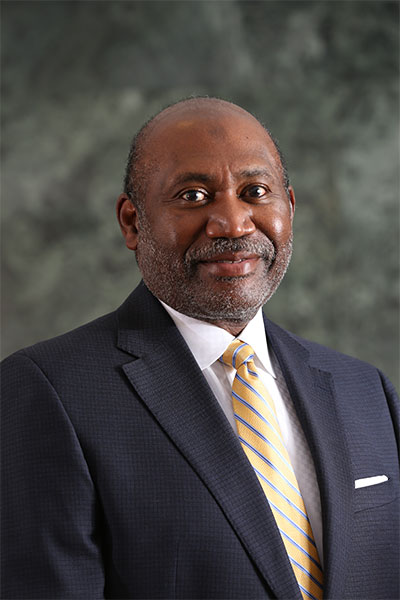Greg Duckett still remembers the faculty advisor at Oberlin College who recommended he drop out and attend trade school instead. He was attending the university on an academic scholarship, choosing that route over other schools that had recruited him for his football prowess. (He would still go on to play football at Oberlin—so well, in fact, that he was recruited to play at the semipro level.)
“I wanted to put my academic career first and try to avoid getting that ‘dumb jock’ label attached to me,” Duckett remembers. And yet he was still looked down on by his advisor. “The upside of that conversation was that it made me more committed than ever to prove him wrong.”
And Duckett did. He graduated from Oberlin, attended law school at the University of Memphis, and served there as student bar governor before ultimately being elected the university’s only African American student body president. He worked on behalf of Senator Al Gore and served an integral role in Mayor Richard Hackett’s administration as the city’s youngest and first ever African American chief administration officer. In 1992, he came to Baptist Memorial Health Care Corp., where he is now senior vice president and chief legal officer.
“Baptist was the only major hospital in the community that did not have in-house legal counsel at the time,” Duckett remembers. “I started as a vice president of government and community relations, but in speaking with the president and vice president, I shared that it was my goal to move into the legal role.”
In just six months, risk management, corporate communications, and internal audit were moved to report up to Duckett. He was promoted to corporate counsel shortly thereafter. “For the first four years, the legal function was me, myself, and I,” Duckett says. And while it would be easy to call the rest history, that history is storied.
Welcome to the Industry
Duckett’s first serious challenge was the creation of Tennessee’s TennCare program, the state’s Medicaid “expansion” project. With just six months on the job and an orientation schedule requiring him to visit all of Baptist’s seventeen hospitals, Governor Ned McWherter announced his administration’s plan to convert the traditional Medicaid program to a TennCare waiver, pulling the government out of negotiating and, instead, handing that to third-party managed care organizations that would handle agreements between hospitals and physicians.

“Candidly, it was removing a slice of the pie that otherwise could have gone to providers, giving it to a third party, and I found myself new in an industry trying to negotiate multimillion-dollar arrangements,” Duckett recalls. “Even our CFO didn’t know what the drop-dead price we could afford to take, so it was a scary time.”
The CLO says it was the baptism by fire that he needed to acclimate to the Tennessee Hospital Association and that would aid efforts to negotiate changes to TennCare several times over.
“As the chief legal officer at a major hospital system, Greg always has a lot of balls in the air when It comes to juggling important issues,” says David King, shareholder at Polsinelli. “But he always demonstrates a lot of skill and insight when digging into the details, asking the right questions, and determining the best course of action.”
Tennessee is one of sixteen states that have not expanded its Medicaid programs over the years, so Duckett’s early tribulations would help establish the conditions under which he’d be working for the coming decades.
Reestablishing Ties
Duckett has also been on the front lines of helping reestablish connections with the University of Tennessee (UT) medical system. A once vital partnership was strained during a healthy portion of the 2000s, when the university moved a significant portion of its transplant operations to Baptist’s area competitor.
“The university was able to get enhanced graduate medical education funding, and it created a twofold dilemma for us,” Duckett explains. “Having an academic appointment is a major accomplishment for any physician, and suddenly, we no longer could offer that opportunity. Secondly, we found ourselves unable to expand different departments in our own health system.”
But over the last year and a half, Baptist has developed a joint venture with UT as well as its competitor. It allows the entire emergency medicine program to move back to Baptist and bring about new developments in anesthesiology, neurology, internal medicine, radiation, and oncology. “We’re also looking to enhance our cardiology department, although it is already the largest group in the city of Memphis,” Duckett says.
Baptist Memorial Health Care Corp. is the largest provider of physicians and practitioners in Memphis, and Duckett says that’s due in part to the ways in which the organization incorporates what he calls “comanagement agreements” into established metrics.
“We do not work on a standard work relative value unit [wRVU] model,” he says, “and so by establishing metrics typically around quality of care and other factors, both the physician and the facility have incentives aligned to those metrics.”
“I’ve done a lot of things out of happenstance in my life; it’s just worked out that way.”
Pride Points and Happenstance
Duckett considers the renewed partnership with the University of Tennessee one of the proudest moments in his career, but given his thirty years at Baptist, there are many. After city politics intervened in the creation of a joint venture, the one thousand employees that Baptist thought it would be allocating to the health center were suddenly out of a job.
“We had to stand in an auditorium and let these people know things had changed,” Duckett says. “It was one of the hardest days of my life. But our former president Steve Reynolds made a commitment that we would find positions for every one of them. Thank God we were able to do so. Steve is an amazing leader.”
Reynolds comes up a lot in Duckett’s interview. It was only by happenstance that the two ever met. After Mayor Richard Hackett bowed out of a speaking engagement after losing a narrow reelection campaign, Duckett stepped in to fill the spot, which was celebrating the tenth anniversary of the creation of the Baptist Memorial Healthcare System.
Unaware of what his next career move might be now that his time in politics had come to an end, Duckett saw the opportunity as a potential job interview. “After we met, Steve wound up calling me a week later,” he says. “I’ve done a lot of things out of happenstance in my life; it’s just worked out that way.”
Call it happenstance or call it fate, Duckett’s path has been guided by his unwavering belief that he can—and will—do great things.
Harris Shelton has had the good fortune to work with Greg Duckett and the Baptist team for many years. We have tremendous respect for the experience, skill, and leadership he brings to the table in helping Baptist find solutions to its legal matters and achieve its healthcare objectives.


